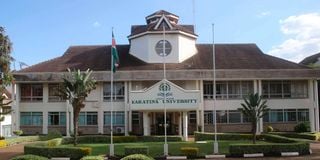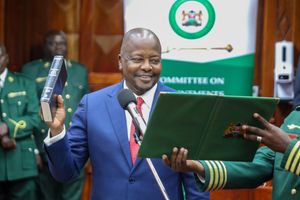Karatina University steps up as custodian of Mukami Kimathi legacy

The administration block at Karatina University in Nyeri County.
Karatina University in Mathira, Nyeri County, has signalled that it will be the custodian of the late Mukami Kimathi's legacy by preserving all information about her and that of Kenya’s other liberation movements.The late Mukami, widow of celebrated freedom fighter Field Marshal Dedan Kimathi, died last week at the age of 96.In July 2012, the university established the Centre for Mau Mau and other Liberation Movement Studies with the aim of becoming a centre for research in the freedom movements globally.In conjunction with the National Museums of Kenya (NMK), the centre collects, documents and archives relevant materials and artifacts associated with fighters for Kenya’s independence. Also read: Mukami Kimathi to be accorded State burial, DP Gachagua announces On April 9, 2016, the joint team visited Ms Mukami at her home in Njabini, Nyandarua County, where it documented her own voice and narrative concerning the struggle for Kenya’s freedom from British colonial rule.Some of the information the centre archived is on her early life, how she remembered her husband, her role in the war for independence, tribulations after independence and her pleas to the government.According to the archived document seen by Nation, Ms Mukami urged the government to recognise and compensate the Mau Mau freedom fighters for the sacrifices they made for the country.She also asked the British government to properly compensate the Mau Mau, terming it as their right and not a privilege because they fought for independence with their blood and sweat.“Most importantly she spoke on how she has over the years been fighting to identify the grave of her husband Kimathi. That is the greatest tragedy because she has passed on without knowing where the grave of her husband is at Kamiti Prison. It has not been possible for her to give her husband a befitting burial,” Prof John Mwaruvie, who is the coordinator of the centre, told Nation on Monday.Prof Mwaruvie said that the University – which is adjacent to Mt Kenya forest – resolved to conduct research after some war veterans claimed that some historians had falsified the history of Mau Mau and, therefore, felt that they needed to give their own version of the story.“That was what formed the basis of forming the centre. We embarked on interviewing Mau Mau veterans. We did audio-visual recordings and gave them the chance to freely express themselves about their experiences and what they have gone through since independence,” he said.The centre has so far produced over 60 documentaries of the Mau Mau veterans and has interviewed the group that was compensated for atrocities and those who are still pursuing compensation.In October 2012, the University, in collaboration with NMK, hosted Kenya’s first Mau Mau International Conference which attracted local and international scholars.Prof Caroline Elkins, a renowned historian at Harvard University, was among the scholars who attended the conference that marked 50 years since the country achieved its independence.Its theme was: ‘Mau Mau and other liberation movements: 50 years after independence’.The centre also identifies freedom heritage sites with a view of rehabilitating and conserving them for posterity.For instance, a Mau Mau trench is located outside the University’s main campus Gate A.During the colonial period, the deep trench was spiked and fenced off by a barbed wire to prevent those who were in Mt Kenya forest from communicating and interacting with those in the heavily guarded villages, commonly known in Kikuyu as Ichagi.The trench is the institution’s physical monument and a representation of the State of Emergency experience that took place in October 20,1952.“Adjacent to the trench, there is a huge Mugumo tree (Ficus natalensis/Ficus thonningii) that has a cave which we believe could have been used as a storage facility for the Mau Mau. Basically, the trench did not deter communication between those who were in the forest and those in the villages,” Prof Mwaruvie, who is also a historian at the University, said.Mugumo is a rare sacred tree among the Kikuyu community.In 2015, NMK sent its archaeologists to rehabilitate the trench by digging it to its original level and fencing it off.Prof Mwaruvie said the rich information archived at the centre will not only help students at the institution but will also be utilised in the education of nationalism in Kenya.“We are also trying to look at the internationalisation of the Mau Mau as a movement. The Mau Mau movement had a global impact,” Prof Mwaruvie said.“Even though the Mau Mau would have been seen as a Kenyan issue, it had ripple effects on other groups who were fighting for independence within the Western world and more in particular within the British colony,” he [email protected]



